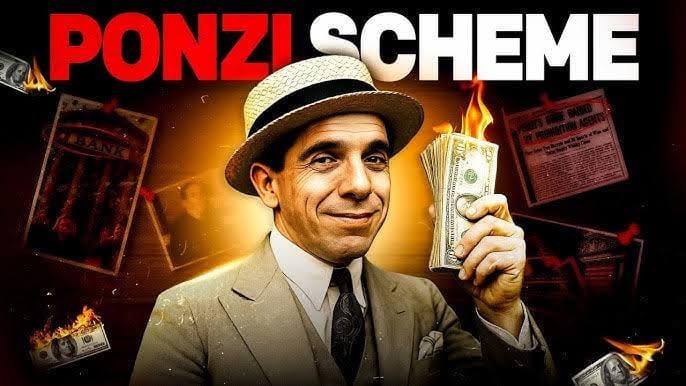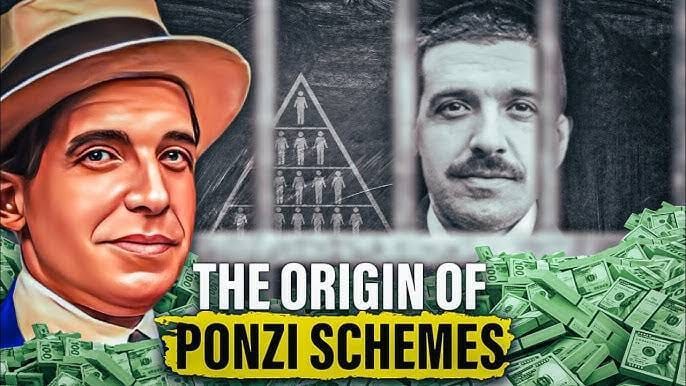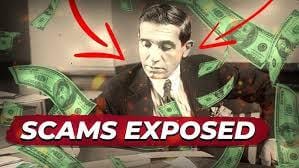- The Business Bulletin Newsletter
- Posts
- Ponzi Schemes: The Man Who Made Millions with Nothing But Lies
Ponzi Schemes: The Man Who Made Millions with Nothing But Lies
How Charles Ponzi invented the most famous scam in history and why people still fall for it today

Hey friend,
Imagine promising people they could double their money in 90 days. Imagine thousands of people literally lining up outside your office, begging you to take their cash. Imagine becoming so rich and famous that newspapers call you a financial genius.
Now imagine it’s all built on absolutely nothing - just lies, charm, and other people’s money.
That’s exactly what Charles Ponzi did in 1920, and his scam was so notorious that we still use his name today. Every time you hear about a “Ponzi scheme,” you’re hearing about a fraud technique that this one Italian immigrant perfected over 100 years ago.
Today I’m telling you the complete story of the man behind history’s most famous scam, how it works, and why people are still falling for it right now.
Meet Charles Ponzi: The World’s Most Charming Criminal
Charles Ponzi was born in Italy in 1882 into a family that had seen better days. His grandparents were successful merchants and officials, but by the time Charles came along, his dad was just a postman.
This fall from grace ate at young Charles. He was bitter, resentful, and obsessed with one question: “Why wasn’t I born rich?”
When his father died, Charles inherited some money and was supposed to use it for college. Instead, he blew it all on fancy clothes, expensive restaurants, gambling, and trying to impress wealthy friends. He wanted to live like he was rich even though he wasn’t.
When the money ran out, Charles faced a choice: get a regular job or chase his dream of easy wealth somewhere else. He chose door number two and sailed to America in 1903 with big dreams and empty pockets.
The American Reality Check
America was not kind to Charles Ponzi. Without family money or connections, he had to do the one thing he despised: actual work.
Over the next few years, he worked as a sign painter, waiter, dishwasher, factory worker, and dozens of other jobs. He never lasted long - either he quit because he hated the work or got fired for trying to cheat customers.
Between jobs, he’d sleep in parks and beg for food. But whenever he managed to save a few dollars, he’d blow it all on a fancy night out, pretending to be rich again.
This pattern led to his first serious crime. Working at a bank in Canada, Ponzi forged a check for $423.58. He got caught immediately and spent three years in prison.
After his release, he tried smuggling immigrants across the border and got another two years in federal prison.
By now, Charles Ponzi had spent five years in jail and was still broke. But he’d learned something important: he was terrible at honest work, but he had a gift for convincing people to trust him.

The Spark of an Idea
In 1919, Ponzi was back in Boston trying yet another failed business venture - a trade magazine called the Trader’s Guide. Nobody wanted to advertise in it, and he was down to his last few dollars.
Then he received a letter from Spain that changed everything. Inside was something called an International Reply Coupon (IRC) - a prepaid coupon that could be exchanged for postage stamps in any country.
Ponzi realised that currency differences meant you could theoretically buy these coupons cheap in one country and redeem them for slightly more value in another. It was called arbitrage, and it was perfectly legal.
He did the math and got excited. If he could scale this operation to millions of coupons, he’d make serious money. He started the Securities Exchange Company in January 1920 to handle this brilliant new business.
There was just one tiny problem: it didn’t actually work.
When Reality Ruins a Perfect Plan
Ponzi quickly discovered that his IRC arbitrage plan had fatal flaws:
First, the profits were so small they’d be wiped out by shipping costs.
Second, there weren’t nearly enough IRCs in the entire world to make the kind of money he was imagining.
Third, the paperwork and logistics would be nightmarish.
Any reasonable person would have admitted the idea was flawed and moved on. But Ponzi wasn’t reasonable - he was desperate and convinced this was his ticket to wealth.
So instead of abandoning the plan, he decided to fake it. If the business didn’t work, maybe he could convince people it did and take their money anyway.
How the Ponzi Scheme Actually Works
The scam that bears Ponzi’s name is brilliantly simple and devastatingly effective:
Step 1: Promise investors huge returns in a short time with little risk. Ponzi offered 50% profit in 45 days or 100% in 90 days.
Step 2: Take money from new investors and use some of it to pay earlier investors their promised returns.
Step 3: When early investors see these amazing returns, most reinvest their profits to make even more money. They also tell friends and family about this incredible opportunity.
Step 4: Use the flood of new money to pay more early investors while keeping the rest for yourself.
Step 5: Repeat until you can’t find enough new investors to pay the old ones, then watch everything collapse.
The scheme works because early investors actually do get paid, which creates powerful word-of-mouth marketing. People see their neighbors doubling their money and want in on the action.
The Psychology of Greed
Ponzi didn’t target sophisticated investors or wealthy businessmen. He knew they’d ask too many questions and demand to see financial records.
Instead, he focused on regular people with more dreams than financial knowledge. People who were struggling and desperate for a way out. People who, like him, wanted to believe there was an easy path to wealth.
Ponzi understood that his real skill wasn’t finance - it was reading people. He knew how to sell his opportunity without seeming desperate or aggressive. He’d act like he didn’t really care whether someone invested or not, which made people want in even more.
He started with 18 neighbors in his first month. When they all got paid their promised returns, word spread like wildfire.

The Peak of Success
By the height of his operation, Ponzi was taking in over $250,000 per day. Thousands of people crowded the streets outside his office, desperate to give him their money.
The Boston Post called him a financial genius. He moved into a mansion, bought expensive cars, wore diamond pins and gold watches, and took first-class trips around the world.
For a brief moment, Charles Ponzi was living the life he’d always felt he deserved. He was rich, famous, and respected. People hung on his every word.
But like all Ponzi schemes, it was built on a foundation of lies that was bound to collapse.
The House of Cards Falls Down
The scheme started unraveling when that same Boston Post decided to investigate Ponzi’s operation. They brought in Clarence Barron, a respected financial expert, to analyse the numbers.
Barron’s conclusion was devastating: For Ponzi’s returns to be legitimate, he would need to have purchased 160 million International Reply Coupons. But there were only 27,000 of them in circulation worldwide.
The math was impossible. The whole thing was a fraud.
Making matters worse, Ponzi hired an honest publicist named William McMasters, who quickly realised his new client was a fake. McMasters said, “Ponzi is a financial idiot. He can hardly even add! He sits with his feet on the desk smoking expensive cigars and talking complete gibberish about postal coupons.”
McMasters gathered evidence and wrote a newspaper exposé that won a Pulitzer Prize and destroyed Ponzi’s reputation forever.

The Inevitable Collapse
When the truth came out, the collapse was swift and brutal:
- Several banks that had invested in Ponzi’s scheme went bankrupt
- Tens of thousands of people lost their life savings
- Ponzi was indicted on 86 counts of mail fraud
- The man who’d been hailed as a genius was revealed as a common criminal
Ponzi pleaded guilty to just one charge and got five years in prison - a surprisingly light sentence considering the massive damage he’d caused.
The Sequel Nobody Asked For
You’d think five years in prison might have taught Ponzi a lesson about the consequences of fraud. You’d be wrong.
Almost immediately after his release, he tried to pull off another scam in Florida. This time he was selling swampland, promising investors a 200% return in just 60 days.
But Ponzi’s fame had become his downfall. Everyone knew who he was now, and nobody was foolish enough to trust him again. He was quickly caught and sent back to prison for another seven years.
When he finally got out, he was a broken man. His wife had divorced him and stayed in America while he was deported to Italy. He spent his final years in poverty, dying alone in a charity hospital in Brazil in 1949.
The man who’d once lived in mansions and worn diamond jewelry was buried in a pauper’s grave.
Why Ponzi Schemes Never Die